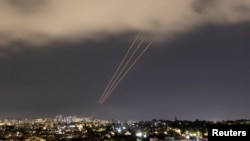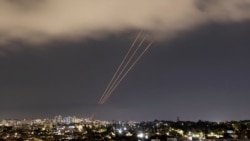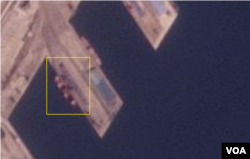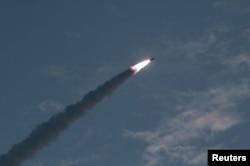미국의 전문가들은 이스라엘 공격에 사용된 이란제 탄도미사일에 북한의 원천 기술이 포함됐을 가능성이 매우 높다고 분석했습니다. 러시아를 연결고리로 북한과 이란이 3각 기술 협력을 하고 있을 가능성도 제기됐습니다. 김영교 기자가 보도합니다.
조셉 디트라니 전 북핵 6자 회담 미국 차석대표는 15일 VOA와의 전화통화에서 “이란의 탄도 미사일 프로그램은 북한이 제공한 기술에 상당히 의존하고 있다”고 밝혔습니다.
[녹취: 디트라니 전 차석대표] “Over the years was North Korea had provided Iran with significant ballistic missile assistance. This goes back to 80s, certainly 90s and early 2000s. Iran’s ballistic missile program relies very heavily on the assistance North Korea previously had provided.”
북한은 과거 이란에 탄도미사일과 관련해 중대한 지원을 했으며, 이같은 지원은 1980년대부터 2000년대 초까지 이어져 왔다는 것입니다.
그러면서 이란이 이스라엘 공습에 사용한 탄도미사일에도 북한의 원천기술이 포함돼 있을 가능성이 매우 크다고 지적했습니다.
앞서 지난 13일 밤 이란은 탄도미사일 최소 120발과 순항 미사일 최소 30발, 드론 170여 대를 이용해 이스라엘에 대한 공습을 감행했습니다.
이란은 공격이 성공적이라고 주장했지만, 이스라엘군에 따르면 이중 대부분은 이스라엘 방공망에 의해 요격돼 무력화된 것으로 전해졌습니다.
디트라니 전 차석대표는 이스라엘이 그동안 우려했던 대로 북한의 미사일 기술이 이란의 이스라엘 공격에 쓰일 수 있다는 가정이 이번 공격으로 현실화된 것은 의심할 여지가 없다고 말했습니다.
[녹취: 디트라니 전 차석대표] “There's no question about that. Yes, Israel had to be very concerned about the assistance that North Korea was providing on ballistic missile technology.”
미사일 전문가인 반 밴 디펜 전 미국 국무부 국제안보비확산 담당 수석부차관보는 이날 VOA와의 전화 통화에서, 공개된 사진에 나타난 잔해를 토대로 추정하면 이란이 이스라엘 공습에 사용한 탄도미사일 중 일부는 북한제 ‘스커드’나 ‘노동’ 미사일 계열로 보인다고 말했습니다.
[녹취: 밴 디펜 전 수석부차관보] “We don't know a lot right now about what missiles were actually used, but some of the debris that they've shown pictures suggest that at least some of the ballistic missiles that were launched were sort of Scud, Nodong’s family missiles. And so back in the early 1990s, North Korea transferred to Iran the capability to produce Scud B and Scud C and Nodong missiles. So in that sense, they're almost certainly what started off is North Korean origin technology involved in this.”
밴 디펜 전 수석부차관보는 1990년대 초 북한이 이란에 스커드 B형과 C형, 그리고 노동 미사일의 생산할 수 있는 역량을 전달했다는 것은 주지의 사실이라며, 그런 면에서 이란의 이스라엘 공격에 북한의 원천적인 기술이 들어가 있는 것은 거의 확실하다고 지적했습니다.
다만 최근 몇 년 간 북한과 이란이 미사일 기술과 관련해 교류가 있었다는 증거는 보지 못했다고 말했습니다.
로버트 피터스 헤리티지재단 핵 억제 및 미사일방어 연구원은 이날 VOA와의 전화통화에서 북한이 직접적으로 협력했다는 것을 입증할 수 있는 증거는 아직 없지만 그럴 가능성은 높다고 말했습니다.
특히 러시아가 공통분모가 돼 그 같은 협력이 시작됐을 가능성이 있다고 추정했습니다.
[녹취: 피터스 연구원] “It's logical to assume that those actors that are already cooperating with one another, vis-a-vis with Russia as a common denominator, are now cooperating directly with one another. What you've seen over the past several months is an axis of cooperation between Pyongyang and Moscow when it comes to their missile capabilities in which North Korea is providing Russia with, in particular, short range capabilities for use in the Ukraine war. And I think that we are seeing enough evidence to show that part of that quid pro quo is Russia, providing technical assistance to advance in particular, North Korea's cruise missile program. And then, of course, we know about the Iranian and Russian cooperation when it comes to missiles and drone technology.”
피터스 연구원은 북한과 러시아 간 협력이 한 축이 돼 지난 몇 달 동안 북한이 러시아에 우크라이나 전쟁에서 사용할 수 있는 단거리 역량의 미사일을 제공하고 있다는 점을 그 예로 들었습니다.
아울러 그 대가의 일부로 러시아가 북한의 순항 미사일 프로그램을 진전시키기 위한 기술적 지원을 제공하고 있다는 것을 보여주는 충분한 증거가 있다고 말했습니다.
또한 미사일과 드론 기술에 있어서 이란과 러시아의 협력도 잘 알려져 있다며, 러시아를 교집합으로 시작한 협력 관계가 북한과 이란 간 직접적인 협력 관계로 진화했을 수 있다고 피터스 연구원은 분석했습니다.
그러면서 만일 북한과 이란의 협력이 있었다면 북한이 이란 미사일의 정확성을 높이는데 도움을 줬을 것으로 관측했습니다.
[녹취: 피터스 연구원] “Where North Korea could help with is on accuracy and so helping to make sure that that the Iranian missiles, which had had some difficulty when it comes to accuracy. I mean, they've frankly, for a number of years have been inaccurate as it can be. And I think that North Korea is in a place where they can help them from an accuracy perspective. North Korea itself has significantly increased the accuracy of its ballistic missiles over the past decade and a half. And so to me, that's the most likely area for cooperation.”
피터스 연구원은 이란의 미사일들이 지난 몇 년 동안 정확성이 떨어져 있었던 반면 북한은 지난 15년 동안 탄도미사일의 정확성을 상당히 높여 왔다면서, 북한과 이란이 미사일과 관련해 협력할 수 있는 가장 큰 부분은 ‘미사일의 정확성 제고’라고 진단했습니다.
브루스 베넷 랜드연구소 선임연구원은 이날 VOA와의 전화통화에서 현 시점에서 이란과 북한의 협력은 직접 증거가 없기에 불분명하다고 전제하면서도, 북한과 러시아가 군사 협력을 주고 받은 점을 미뤄볼 때 이란과도 그렇게 할 가능성이 매우 크다고 지적했습니다.
[녹취: 베넷 선임연구원] “I think at this stage, the best we can say is, we don't know whether or not North Korea provided any technologies. Since North Korea has been sending them to Russia, there's no reason to believe that they wouldn't also send them to Iran. So it's certainly possible they did. I just haven't seen any evidence of it.”
또한 이란이 이스라엘로 발사한 탄도미사일이 대부분 격추된 사실을 지적하며, 이란이 재고 정리 차원에서 구형 미사일을 대거 발사했을 가능성도 제기했습니다.
그러면서 그럴 경우 단거리 탄도미사일인 스커드가 아닌 중거리 탄도미사일 구형 노동 미사일이었을 가능성이 더 높다고 분석했습니다.
[녹취: 베넷 선임연구원] “The ballistic missiles seem to be pretty easy to shoot down. And that suggests that they were old missiles that they were trying to get rid of the stocks and the distances of the launch were such that wouldn't have been a Scud missile. It could have been potentially a Nodong. That would have enough range. So it may be that they fired a bunch of old Nodongs. If that's the case, those are very old missiles and not particularly daunting in terms of technology.”
베넷 선임연구원은 만일 이란이 북한제 노동 미사일을 사용했다면 이는 기술적으로 위협적인 수준은 아니라고 말했습니다.
그러나 이란이 북한이 신형 미사일을 제공받고도 아직 사용하지 않고 남겨뒀을 가능성도 있는 만큼 위협을 예의주시해야 한다고 지적했습니다.
2019년부터 북한이 집중적으로 시험발사해 온 북한판 이스칸데르로 알려진 KN-23과 같은 미사일이 이란에 전달됐을 수 있다는 겁니다.
[녹취: 베넷 선임연구원] “We don't know is what other kinds of missiles have been transferred, but probably some of the KN-23 missiles have been and if so, that would mean that you've got missiles that can maneuver, you've got missiles that can pop up and pop down and so a much more threatening kind of capability. And that may well be what Iran chose to hold back on at this stage. So that if Israel does indeed retaliate as some expect they do, Iran will have something to escalate. With to cause some real damage to Israel.”
KN-23 미사일은 변칙 기동이 가능한 단거리 탄도미사일로 북한이 우크라이나 전쟁에서 사용하도록 러시아에도 제공했을 것으로 알려지고 있습니다.
베넷 선임연구원은 이란이 KN-23 미사일을 보유하고 있을 경우 “훨씬 더 위협적인 종류의 능력을 가진 미사일을 가지고 있다는 것을 의미한다”면서 이란이 현 단계에서는 사용을 자제했을 가능성이 있다고 봤습니다.
그러면서 이란은 이스라엘이 자신들에게 보복 공격을 할 경우 대응 무기로 사용하기 위해 이스라엘에 대한 첫 공격에서 사용한 무기들보다 더 강력한 신형 탄도미사일 무기들을 대기 시켜놓고 있을 수 있다고 말했습니다.
VOA 뉴스 김영교입니다.













Forum